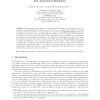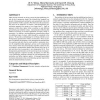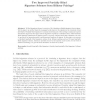30 search results - page 5 / 6 » Random Beacon for Privacy and Group Security |
CRYPTO
2007
Springer
13 years 11 months ago
2007
Springer
Abstract. Secure multiparty computation allows a group of distrusting parties to jointly compute a (possibly randomized) function of their inputs. However, it is often the case tha...
ISW
2007
Springer
13 years 11 months ago
2007
Springer
Abstract. We study the provable security of identity-based (ID-based) key agreement protocols. Although several published protocols have been proven secure in the random oracle mod...
SIGMOD
2010
ACM
13 years 5 months ago
2010
ACM
Most previous research on privacy-preserving data publishing, based on the k-anonymity model, has followed the simplistic approach of homogeneously giving the same generalized val...
CCS
2008
ACM
13 years 7 months ago
2008
ACM
In 1998, Blaze, Bleumer, and Strauss suggested a cryptographic primitive termed proxy re-signature in which a proxy transforms a signature computed under Alice's secret key in...
ACISP
2005
Springer
13 years 10 months ago
2005
Springer
A blind signature scheme is a protocol for obtaining a digital signature from a signer, but the signer can neither learn the messages he/she sign nor the signatures the recipients ...



